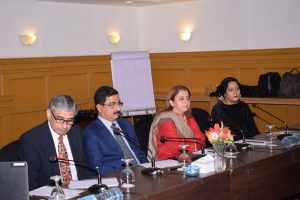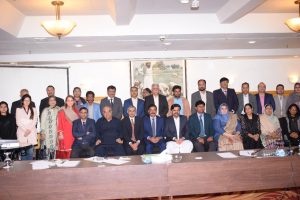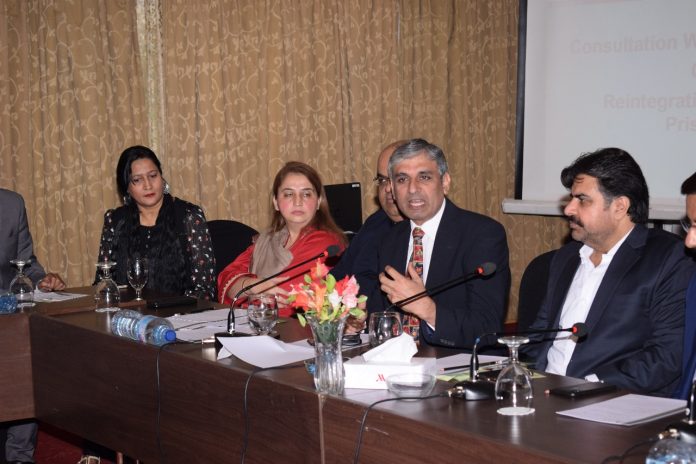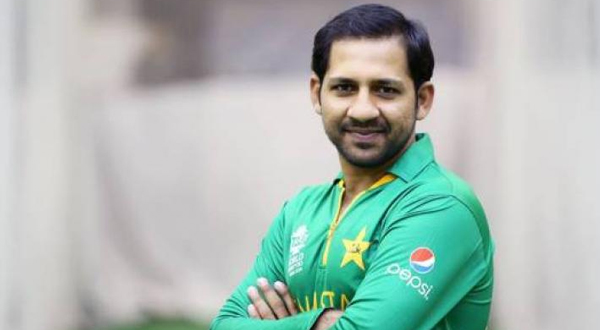KARACHI (Press Release): The Society for the Protection of Rights of the Child (Sparc) in consultation with the Sindh Prisons Department held a consultation on the Economic Rehabilitation and Reintegration Support to Young People in Prisons on Tuesday.

Speaking on the occasion, Nasir Hussain Shah, the Sindh Minister for Local Government, Forests and Religious Affairs said: “We are reforming the laws and we had already reformed the Prison Law. Prison reforms were a revolutionary step of the Sindh government towards repealing prison laws that were one-and-a-half-century old.
H added that it would provide a policy for regulating such matters and make provisions for the establishment, management, control and security of prisons and welfare of prisoners.

Sparc Executive Director Sajjad Cheema said that in collaboration with UNDP & Sindh Prison Department, Sparc would impart the learning to implement a holistic pilot program aimed towards complete social reintegration of youth prisoners in Malir Prison, Women Prison, and the adjoining Youthful Offenders Industrial School Karachi to prevent behaviors that fuels VE recruitment.”
Ms. Shumaila Waheed, the Project Manager of Sparc said that the Society for the Protection of Rights of the Child’s experience with youth of Sindh particularly Karachi showed that violent extremist (VE) organizations targets impressionable youth to instill hatred and divisive narratives.
She added that Sparc has worked to improve jail conditions and successfully conducted rehabilitative projects with young and adult prisoners in all provinces of the country.
Mr. Sidra Imran, the PTI member of Sindh Assembly said that equal opportunities would be provided to prisoners to participate in cultural activities and vocational training without any discrimination on the grounds of race, offence, colour, gender, language, religion, sect, ethnicity or status.
Advisor to Chief Minister Sindh on Human Rights Mr. Veerji Kohli shared his experience of jail on the occasion.
He said: “I spent one year in Central Jail Hyderabad. I lived in general barracks. It was a remarkable experience. People from all backgrounds and religions used to live peacefully there. This you don’t even see in our society. Jails are not for punishment. They are for reflection and rehabilitation. We have to start from home. If we don’t do that, crime rate will only improve. Don’t consider arrest as a CRIME because in Pakistan arrest happens first and investigation happens later.”
IG Prison Sindh Mr. Nusrat Maghan said: “We are highly committed by our self to provide all the best possible facilities in prisons. Moreover, we have to change mindset of people. We can do it only by joining hands. This youth is our future. If we don’t give them opportunities, our future will only get darker. We can’t discriminate or exclude. Only then Pakistani will become a brighter.”
In the beginning of program, Sparc’s Kashif Mirza shared the statist of the Offender Youth of Karachi.
He added that Karachi, the country’s most populous city has the highest number of prisoners.
According to the Sindh Prisons’ estimates, in Nov 2019, there are approximately 9500 prisoners in four prisons of Karachi i.e. Central Prison (4,956), District Prison and Correctional Facility, Malir (4,196), Women Prison (131), Youthful Offenders’ Industrial School Karachi (121). Majority of this population consists of under-trial prisoners (82%) detained under minor and boilable offences.
The consultation was attended by Mr. Kazi Nazir Ahmed, DIG Sindh Prisons and Corrections Services Superintendent of Malir Jail, Mr. Aurangzaib Kango, Mr. Hassan Setho, Superintendent of Malir Jail, Ms. Sheeba Shah DIG Women and YOIS, members from government departments, corporate & industrial sector, civil society & media.





